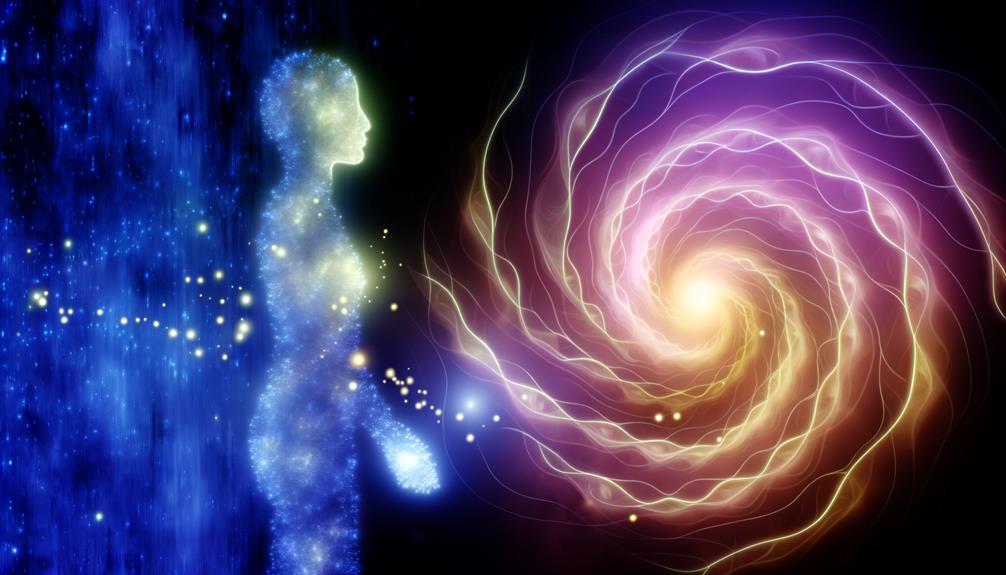Aura Name Meaning in English
The name 'Aura' originates from the Latin word "aura," meaning 'breeze' or 'air.' It also has roots in the ancient Greek word 'ἀήρ' (aēr). Historically, Aura personified the breeze in Greek mythology and has evolved to represent various spiritual, metaphysical, and cultural elements.
Modern interpretations associate Aura with an invisible energy field surrounding living beings and denote qualities such as purity and enchantment. The name's popularity fluctuates, often resurging during periods favoring unique and mystical names, influenced by notable figures such as Aura Dione and Aura Garrido.
Discover more about its layered cultural and mystical significance.

Key Takeaways
- 'Aura' originates from the Latin word meaning 'breeze' or 'air'.
- The name signifies an invisible energy field surrounding living beings.
- It embodies purity, tranquility, mystery, and enchantment.
- 'Aura' symbolizes one's spiritual essence or essentiality.
- The name conveys subtlety and an ethereal presence.
Etymology of Aura
The etymology of the name 'Aura' traces its origins to the Latin word 'aura,' meaning 'breeze' or 'air,' and further back to the Greek word 'ἀήρ' (aēr), signifying a gentle breeze or the breath of air.
This etymological lineage underscores a semantic field centered on lightness and movement, evoking imagery of ephemeral natural phenomena. The term's Greek roots, in particular, lend it a poetic and almost ethereal quality, often associated with the intangible essence of atmosphere.
Historical Background
The historical background of the name Aura encompasses its ancient origins, tracing back to classical antiquity where it was often associated with divine and mystical elements.
Over time, its cultural significance has evolved, influencing literature, art, and mythology across various civilizations.
In contemporary contexts, the name has garnered diverse interpretations, reflecting a blend of historical reverence and modern semantic shifts.
Ancient Usage Origins
Historically, the name 'Aura' finds its roots in ancient civilizations, particularly within the mythological and linguistic contexts of Greek and Roman cultures. In Greek mythology, Aura personified the breeze and was considered a minor deity.
The term 'aura' itself originates from the Greek word 'ἀήρ' (aer) meaning air or breeze, which was later adopted into Latin as 'aura'. This name also appears in various classical texts and inscriptions, reflecting its significance.
Key points include:
- Mythological Personification: Aura as a deity representing the breeze.
- Linguistic Origin: Derived from Greek 'ἀήρ' (aer), meaning air.
- Roman Adoption: Incorporated into Latin as 'aura'.
- Classical References: Mentioned in ancient texts and inscriptions.
This historical lineage underscores the name's deep cultural and linguistic heritage.
Cultural Significance Evolution
Over the centuries, the name 'Aura' has transcended its mythological origins to attain a multifaceted cultural significance, reflective of evolving linguistic, artistic, and social contexts.
Initially rooted in ancient Greek mythology, where 'Aura' symbolized a gentle breeze, its usage expanded during the Renaissance, integrating into artistic and literary works as an ethereal, almost mystical essence. This period marked a shift, where 'Aura' began to signify not just physical phenomena but also intangible qualities, such as charismatic presence.
The 19th and 20th centuries further broadened its scope, embedding 'Aura' into spiritual and metaphysical discourses, thereby enriching its semantic layers. Consequently, the name 'Aura' embodies a rich tapestry of historical and cultural evolution, mirroring humanity's quest for meaning.
Modern Interpretations Overview
Modern interpretations of the name 'Aura' reflect a synthesis of historical influences and contemporary cultural dynamics, illustrating its continued evolution in meaning and significance. Historically, 'Aura' signified a gentle breeze or a subtle, perceptible emanation, often linked to ethereal qualities. Today, it encompasses broader interpretations shaped by modern sensibilities:
- Spiritual Connotations: Emphasized in New Age philosophies, 'Aura' represents the energy field surrounding a person.
- Artistic Inspirations: Frequently invoked in literature, music, and visual art to depict a sense of mystery and allure.
- Scientific Resonance: In neurology, it denotes sensory experiences preceding migraines or epileptic seizures.
- Cultural Symbolism: Utilized in branding and media to evoke elegance, sophistication, and an otherworldly charm.
These multifaceted interpretations highlight the name's rich and adaptable essence.
Cultural Significance
The name 'Aura' holds varied and profound cultural significance across different societies, where it often symbolizes ethereal qualities such as light, breeze, and spiritual energy.
In ancient Greek culture, 'Aura' was personified as a deity associated with the gentle breeze, embodying the essence of nature's soft, invisible forces.
Similarly, in Roman mythology, Aura was linked to the air and sky, representing the breath of life itself.
Meanwhile, in the context of contemporary Western culture, the name is frequently associated with a luminous emanation or an invisible force surrounding a person, reflecting inner qualities or emotions. In this way, the concept of aura has become a popular topic in spiritual and New Age circles, with individuals seeking to understand and harness their own personal aura. Some even turn to methods such as reiki or crystal healing to cleanse or protect their aura. The Santana name meaning also holds significance as it pertains to this idea of a person’s spiritual energy and presence.
Such diverse cultural interpretations underline the name's rich, multifaceted significance, making it a potent symbol in various cultural narratives and practices.
Mystical Connotations
The name Aura carries profound mystical connotations, often linked with the concepts of symbolism and spiritual energy. Historical references to mystical practices frequently highlight the significance of an aura as an ethereal presence surrounding individuals.
In modern mysticism, the interpretation of an aura continues to be associated with one's spiritual and emotional state, resonating deeply in contemporary metaphysical studies.
Symbolism and Spiritual Energy
In exploring the mystical connotations of the name 'Aura,' it becomes evident that its symbolism is deeply intertwined with concepts of spiritual energy and ethereal presence. The term 'aura' often signifies an invisible emanation surrounding a person, suggesting a profound connection to metaphysical domains.
This connection is reflected in several key aspects:
- Energy Field: Aura is perceived as a luminous field of energy enveloping individuals.
- Spiritual Insight: It is believed to give insights into one's emotional and spiritual state.
- Healing Properties: Many traditions associate auras with the ability to influence physical and emotional healing.
- Color Interpretation: Different aura colors are thought to represent various personality traits and spiritual conditions.
These elements collectively underscore the rich, mystical essence embedded in the name 'Aura.'
Historical Mystical References
Throughout history, mystical references to auras have frequently appeared in various cultural and religious texts, emphasizing their significance in understanding human spirituality and metaphysical phenomena.
Ancient Hindu scriptures, such as the Vedas, describe the aura as a subtle body of energy encircling the physical form, indicative of one's spiritual state.
Similarly, early Christian mystics, including Hildegard of Bingen, documented visions of radiant light surrounding individuals, interpreting these as manifestations of divine presence.
In Chinese Taoism, the qi, or life force, is perceived as an energy field that can be sensed around living beings.
These historical references underscore the enduring belief in auras as essential for comprehending the deeper layers of human existence and spiritual health.
Aura in Modern Mysticism
Modern mysticism conceptualizes the aura as an intricate energy field that reflects an individual's emotional, mental, and spiritual states, offering insights into their overall well-being and spiritual development. This perspective posits that the aura is not merely a metaphysical concept but a diagnostic tool for identifying imbalances and potential growth areas.
Practitioners often engage in aura reading to discern various aspects of a person's life, utilizing:
- Color variations to indicate different emotional and psychological states.
- Energy density to assess energy and health.
- Shape and clarity to reveal the strength of spiritual connections.
- Movement patterns to interpret dynamic changes in one's life.
Understanding these elements enhances practitioners' abilities to offer holistic guidance and support for personal and spiritual advancement.
Nature and Symbolism
The name 'Aura' evokes a rich tapestry of natural imagery and profound symbolic meanings, reflecting its deep roots in various cultural and linguistic traditions.
Etymologically, 'Aura' is derived from the Greek word for breeze or soft wind, symbolizing subtlety and ethereal presence. In a broader symbolic context, it signifies an invisible emanation or energy field believed to surround living beings, often associated with one's spiritual essence or essentiality.
The natural connotation extends to the idea of purity and tranquility, akin to a gentle, invigorating breeze. Additionally, in literature and art, 'Aura' is frequently employed to denote an atmosphere of mystery and enchantment, enhancing its multifaceted symbolism and universal appeal across cultures.
Popularity Over Time
In recent decades, the name 'Aura' has experienced fluctuating levels of popularity, gaining particular resonance in periods marked by a renewed interest in unique and meaningful names. This trend can be attributed to several factors:
- Cultural Shifts: A growing appreciation for cultural diversity and heritage.
- Media Influence: Increased exposure through literature, television, and social media.
- Alternative Naming Trends: A move away from traditional names towards more distinctive choices.
- Spiritual Connotations: The name's association with ethereal and mystical qualities.
These elements collectively contribute to the ebb and flow of 'Aura's popularity. Detailed analysis of name databases and social trends reveals that 'Aura' often resurfaces during times of heightened interest in individuality and personal expression, reflecting broader societal shifts towards embracing uniqueness.
Famous Namesakes
Renowned individuals bearing the name 'Aura' have greatly contributed to its allure and cultural resonance. Notable figures include Aura Dione, a Danish singer-songwriter known for her eclectic musical style and international hits, and Aura Garrido, a Spanish actress acclaimed for her work in film and television. Additionally, Aura Lewis, a South African reggae singer, has left an indelible mark on the genre with her powerful vocals and socially conscious lyrics. These namesakes exemplify the diverse talents and cultural impact associated with the name Aura, enhancing its appeal and significance across various fields.
| Name | Profession | Contributions |
|---|---|---|
| Aura Dione | Singer-Songwriter | International hits, eclectic style |
| Aura Garrido | Actress | Acclaimed roles in film and television |
| Aura Lewis | Reggae Singer | Powerful vocals, socially conscious lyrics |
Conclusion
In summation, the name ‘Aura’ carries profound historical, cultural, and mystical significance, tracing its etymology to ancient languages and mythologies. Its associations with light, energy, and spirit have made it a popular choice across various cultures. Similarly, understanding the balaj name significance in English reveals connections to leadership and protection in numerous traditions, further underscoring the rich tapestry of meanings that names can embody.
Its symbolic resonance with nature and ethereal qualities has cemented its allure across various societies and eras.
Despite fluctuating in popularity, the name has stood the test of time, often chosen for its unique and evocative essence.
As the adage goes, 'what's in a name?'—in the case of 'Aura,' quite a lot indeed.






